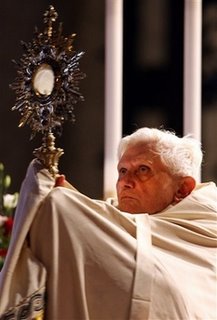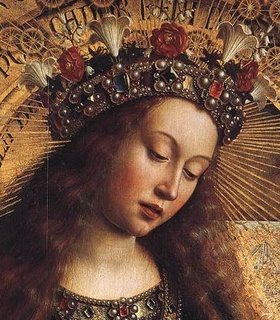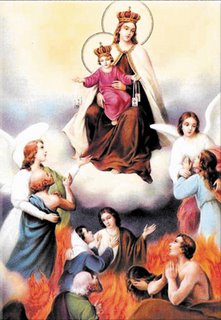
"Anyone who has discovered Christ must lead others to Him. A great joy cannot be kept to oneself. It has to be passed on" (World Youth Day, 2005)
Photo Source: Pope Benedict XVI on Corpus Chriti in 2006 (AP Photo/Pier Paolo Cito)


With the certainty of faith we know that Jesus Christ is king in the full, literal, and absolute sense of the word; for He is true God and man. This does not, however, prevent Mary from sharing His royal prerogatives, though in a limited and analogous manner; for she was the Mother of Christ, and Christ is God; and she shared in the work of the divine Redeemer, in His struggles against enemies and in the triumph He won over them all. From this union with Christ the King she assuredly obtains so eminent a status that she stands high above all created things; and upon this same union with Christ is based that royal privilege enabling her to distribute the treasures of the kingdom of the divine Redeemer. And lastly, this same union with Christ is the fountain of the inexhaustible efficacy of her motherly intercession in the presence of the Son and of the Father.Prayer to Our Lady, Queen of Prophets
Without doubt, then, does our holy Virgin possess a dignity that far transcends all other creatures. In the eyes of her Son she takes precedence over everyone else. In order to help us understand the preeminence that the Mother of God enjoys over all creation, it would help to remember that from the first moment of her conception the holy Virgin was filled with such a plenitude of grace as to surpass the graces enhancing all the saints. Recall what our predecessor Pius IX, of blessed memory, wrote in his Bull Ineffabilis Deus: "More than all the angels and all the saints has God ineffable freely endowed Mary with the fullness of the heavenly gifts that abound in the divine treasury; and she, preserving herself ever immaculately clean from the slightest taint of sin, attained a fullness of innocence and holiness so great as to be unthinkable apart from God Himself, a fullness that no one other than God will ever possess."
Spurred on by piety and faith, may we glory in being subject to the rule of the Virgin Mother of God; she bears the royal sceptre in her hand, while her heart is ever aflame with motherlove.
ENCYCLICAL OF POPE PIUS XII ON PROCLAIMING THE QUEENSHIP OF MARY OCTOBER 11, 1954

 There are many Christians who do not even know why they are in the world. "Oh my God, why hast Thou sent me into the world?" "To save your soul. " "And why dost Thou wish me to be saved?" "Because I love you. " The good God has created us and sent us into the world because He loves us; He wishes to save us because He loves us. . . . To be saved, we must know, love and serve God. Oh, what a beautiful life! How good, how great a thing it is to know, to love and serve God! We have nothing else to do in this world. All that we do besides is lost time. We must act only for God, and put our works into His hands. . . . We should say, on awaking, "I desire to do everything today for Thee, O my God! I will submit to all that Thou shalt send me, as coming from Thee. I offer myself as a sacrifice to Thee But, O God, I can do nothing without Thee. Do Thou help me!"
There are many Christians who do not even know why they are in the world. "Oh my God, why hast Thou sent me into the world?" "To save your soul. " "And why dost Thou wish me to be saved?" "Because I love you. " The good God has created us and sent us into the world because He loves us; He wishes to save us because He loves us. . . . To be saved, we must know, love and serve God. Oh, what a beautiful life! How good, how great a thing it is to know, to love and serve God! We have nothing else to do in this world. All that we do besides is lost time. We must act only for God, and put our works into His hands. . . . We should say, on awaking, "I desire to do everything today for Thee, O my God! I will submit to all that Thou shalt send me, as coming from Thee. I offer myself as a sacrifice to Thee But, O God, I can do nothing without Thee. Do Thou help me!" Pope John Paul I, known as the Smiling Pope, was Pope for only 33 days in the summer of 1978. He died unexpectedly and many people still claim that he was murdered in a conspiracy. Well, his Cause for Beatification is beginning to advance.
Pope John Paul I, known as the Smiling Pope, was Pope for only 33 days in the summer of 1978. He died unexpectedly and many people still claim that he was murdered in a conspiracy. Well, his Cause for Beatification is beginning to advance.The first stage of the cause for beatification of Pope John Paul I will be concluded in November, according to the vice-postulator for that cause.
Msgr. Giorgio Lise told Vatican Radio that an investigation in the Venice archdiocese is nearing its conclusion, and the results will be forwarded to the Vatican in the autumn, for further study by the Congregation for the Causes of Saints. Witnesses regarding the life of Pope John Paul I have been heard in Rome and in Vittorio Veneto as well as Venice.
Cardinal Albino Luciani was the Bishop of Vittorio Veneto and then Patriarch of Venice before he was elected as Sovereign Pontiff in 1978. He died after less than a month as Pope. Then anniversary of his papal election will be observed in Rome on August 26.
Source: Catholic World News



.jpg)
.jpg)
.jpg)
.jpg)
.jpg)
 Can we, of our own strength, avoid sin, and practice virtue? No, my children, we can do nothing without the grace of God: that is an article of faith; Jesus Christ Himself taught it to us. See, the Church thinks, and all the saints have thought with her, that grace is absolutely necessary to us, and that without it we can neither believe, nor hope, nor love, nor do penance for our sins. Saint Paul, whose piety was not counterfeit, assures us, on his part, that we cannot of ourselves even pronounce the name of Jesus in a manner that can gain merit for Heaven. As the earth can produce nothing unless it is fertilised by the sun, so we can do no good without the grace of the good God. Grace, my children, is a supernatural assistance which leads us to good; for example, there is a sinner who goes into a church and hears an instruction: the preacher speaks of Hell, of the severity of the judgments of God; he feels himself interiorly urged to be converted; this interior impulse is what is called grace. See, my children, it is the good God taking that sinner by the hand, and wishing to teach him to walk. We are like little children: we do not know how to walk on the road to Heaven; we stagger, we fall, unless the hand of the good God is always ready to support us. O my children! how good is the good God! If we would think of all that He has done, of all that He still does every day for us, we should not be able to offend Him--we should love Him with all our heart; but we do not think of it, that is the reason. . . . The angels sin, and are cast into Hell. Man sins, and God promises him a Deliverer. What have we done to deserve this favour? What have we done to deserve to be born in the Catholic religion, while so many souls are every day lost in other religions? What have we done to deserve to be baptised, while so many little children in France, as well as in China and America, die without Baptism? What have we done to deserve the pardon of all the sins that we commit after the age of reason, while so many are deprived of the Sacrament of Penance?
Can we, of our own strength, avoid sin, and practice virtue? No, my children, we can do nothing without the grace of God: that is an article of faith; Jesus Christ Himself taught it to us. See, the Church thinks, and all the saints have thought with her, that grace is absolutely necessary to us, and that without it we can neither believe, nor hope, nor love, nor do penance for our sins. Saint Paul, whose piety was not counterfeit, assures us, on his part, that we cannot of ourselves even pronounce the name of Jesus in a manner that can gain merit for Heaven. As the earth can produce nothing unless it is fertilised by the sun, so we can do no good without the grace of the good God. Grace, my children, is a supernatural assistance which leads us to good; for example, there is a sinner who goes into a church and hears an instruction: the preacher speaks of Hell, of the severity of the judgments of God; he feels himself interiorly urged to be converted; this interior impulse is what is called grace. See, my children, it is the good God taking that sinner by the hand, and wishing to teach him to walk. We are like little children: we do not know how to walk on the road to Heaven; we stagger, we fall, unless the hand of the good God is always ready to support us. O my children! how good is the good God! If we would think of all that He has done, of all that He still does every day for us, we should not be able to offend Him--we should love Him with all our heart; but we do not think of it, that is the reason. . . . The angels sin, and are cast into Hell. Man sins, and God promises him a Deliverer. What have we done to deserve this favour? What have we done to deserve to be born in the Catholic religion, while so many souls are every day lost in other religions? What have we done to deserve to be baptised, while so many little children in France, as well as in China and America, die without Baptism? What have we done to deserve the pardon of all the sins that we commit after the age of reason, while so many are deprived of the Sacrament of Penance?
Any man who prays or prophesies with his head covered brings shame upon his head. But any woman who prays or prophesies with her head unveiled brings shame upon her head, for it is one and the same thing as if she had had her head shaved. For if a woman does not have her head veiled, she may as well have her hair cut off. But if it is shameful for a woman to have her hair cut off or her head shaved, then she should wear a veil.Alice von Hildebrand, from the book Women and the Priesthood
"Women are definitely more mysterious than men, not only because their affective life is more complex and more refined, but especially because there is something in women that calls for veiling. It is not by accident that women traditionally wore a veil, and that, up to Vatican II, they wore veils in Catholic churches. This custom was deeply symbolic, and alas this symbolism is now lost. Under the influence of feminism, many Catholics were led to believe that veiling indicated some sort of inferiority, and for this reason it was abolished.
"This interpretation rests on a misunderstanding. Far from indicating inferiority, the veil points to sacredness. While we do cover what is ugly or decaying, we also veil what is sacred, mysterious, and sublime. When Moses came down from Mount Sinai, he covered his face to hide the glow that was apparent because God had deigned to speak with him: Moses' body reflected the depth and mystery of his experience.
"Every woman carries within herself a secret most sacred, mysterious, and sublime. This secret is life. Eve means "the mother of the living." In the mystery of the female body, human life finds its beginning: not in the male semen but in the fecundated egg, hidden in the cavern of the female body. There God creates a new soul which is exclusively his work, and in which neither father nor mother has a part. This creation takes place when the male seed fecundates the female egg. Thus at that very moment a closeness exists between divine action and the female body which marks the latter as sacred ground. This is why the way a woman dresses, the way she sits, walks, laughs, should always be marked by a note of holy reserve. A woman conscious of her unmerited privilege will necessarily adopt a bodily posture- what is today called body language- which adequately reflects this calling."